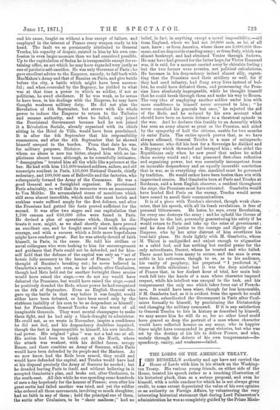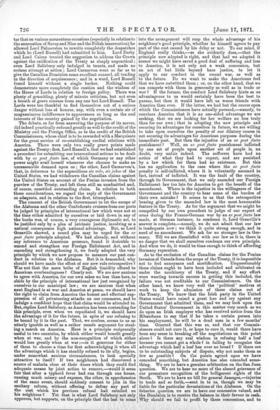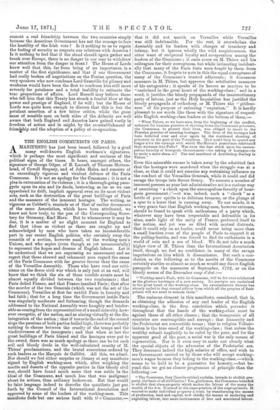THE LORDS ON THE AMERICAN TREATY.
LORD RUSSELL'S authority and age have not carried the House of Lords with him in his attack on the Washing- ton Treaty. His various young friends, on either side of the House, treated his speech rather as a touching illustration of his historical pluck, than as a serious proposal, and even he himself, with a noble candour for which he is not always given credit, to some extent depreciated the value of his own opinion as an authority on Foreign Affairs, by volunteering the very interesting historical statement that during Lord Pilmeniton's administration he was 80 completely guided by the Prime Minis-
ter that on various momentous occasions (especially in relation to the annexation of Savoy and Nice and the Polish insurrection) he allowed Lord Palmerston to rewrite completely the despatches which he (Lord Russell) had submitted to him. Lord Derby and Lord Cairns treated the suggestion to address the Crown against the ratification of the Treaty as simply unpractical ; even Lord Salisbury only indulged in taunts, and made no serious attempt at action ; Lord Carnarvon went so far as to give the Canadian Dominion some excellent counsel, all tending in the direction of acquiescence ; and in a word, Lord Russell found himself without a single backer. Nothing could demonstrate more completely the caution and the wisdom of the House of Lords in relation to foreign policy. There was plenty of grumbling, plenty of minute criticism, but not even a breath of grave censure from any one but Lord Russell. The Lords were too thankful to find themselves out of a serious danger without loss of honour, nay, with even a certain air of magnanimous indifference to appearances so long as the real interests of the country gained by the negotiation.
The debate, so far from answering the purpose of its mover, did indeed practically redound greatly as well to the credit of the Ministry and the Foreign Office, as to the credit of the British Commissioners, whose chief is to be rewarded with a Marquisate for the great service of re-establishing cordial relations with America. There were only two really grave points made against the Treaty; first, Lord Russell's, that we had established a precedent for submitting our international actions to be dealt with by ex post facto law, of which Germany or any other power might avail herself whenever she chooses to make an unreasonable demand upon us ; the other, Lord Carnarvon's, that, in deference to the supercilious sic volo, sic jubeo of the United States, we had withdrawn the Canadian claims against the United States on account of the Fenian invasion from the purview of the Treaty, and left them still an unadmitted and, of course, unsettled outstanding claim. In relation to both these considerations, we regard the reply of the Government as adagnate, and in relation to the first, triumphant.
The consent of the British Government to let the escape of the Alabama and the other Confederate cruisers from our ports be j ridged by principles of international law which were not at the time either admitted by ourselves or laid down in any of the books was, of course, a very courageous diplomatic act, to be justified only by a plea of intrinsic justice, involving as a natural consequence high national advantage. But, as Lord Oranville showed, a sound plea may be urged for the ex post facto principle adopted. We had already, and without any reference to American pressure, found it desirable to amend and strengthen our Foreign Enlistment Act, and in amending and strengthening it, we freely adopted the very principle by which we now propose to measure our past con- duct in relation to the Alabama. But it is demanded, why should we have made the effect of our new rule retrospective ? Was not that the mere bribe of English timidity offered to American overbearingness ? Clearly not. We are now anxious to agree with America, for our own sakes no less than hers, to abide by the principle of international law just recognized by ourselves in our municipal law ; we are anxious that when next England is at war and America at peace, we should have the right to claim from America the honest and effectual sup- pression of all privateering attacks on our commerce, and to indulge a confident hope that that claim would be attended to. But, replies Lord Salisbury, as America has been contending for this principle, even when we repudiated it, we should have the advantage of it for the future, in spite of our refusing to be bound by it in the past. That, we confess, seems to us an utterly ignoble as well as a rather unsafe argument for steal- ing a march on America. Here is a principle reciprocally useful to two countries, by which either would benefit greatly when at war, and by the non-recognition of which either would lose greatly when at war ;—is it generous for either of them to choose a time for first acknowledging it when all the advantage which it has steadily refused to its ally, begins, under somewhat anxious circumstances, to look specially attractive to itself? If two neighbours had discovered a source of malaria close at their doors which they could find adequate means by joint action to remove,—would it seem fair that after a typhoid fever had run through one house, causing much misery and expense, the other, in apprehension of the same event, should suddenly consent to join in the sanitary reform, without offering to defray any part of the cost which his previous refusal had entailed on his neighbour ? Yet that is what Lord Salisbury not only approves, but supports, on the principle that the last to come
into the arrangement will reap the whole advantage of his neighbour's good principle, whether he himself agrees to pay part of the cost caused by his delay or not. To our mind, if England really thinks,—as she evidently does,—that the principle now adopted is right, and that had we adopted it sooner we might have saved a good deal of suffering and loss to America, it is not only not a weak concession, but an act of but little beyond bare justice, to let it apply to our conduct in the recent war, as well as to the future. Do we want to make the Americans feel that we have outwitted them ; or, on the other hand, that we can compete with them in generosity as well as in trade or war ? If the former, the conduct Lord Salisbury hints as -so advantageous to us would certainly have been the best to pursue, but then it would have left us worse friends with America than ever. If the latter, we had but the course open which the Commissioners have actually pursued,—namely, to convince America that it is no one-sided advantage we are seeking, that we are looking for her welfare no less truly than for our own ; that in adopting the new principle and securing its advantages for ourselves in future, we are willing to take upon ourselves the penalty of our dilatory course in not securing its advantages for American purposes during the immediate past. But then the injustice of an ex post facto punishment ? Well, an ex post facto punishment inflicted by one set of people upon another set of people is, no
doubt, very unfair indeed. The sufferers have had no notice of what they had to expect, and are punished by a law which for them had no existence. But this has no application to the case where the ex post facto penalty is self-inflicted, where it is voluntarily assumed in fact, instead of inflicted. It was the fault of the country, through its Government, that we only amended our Foreign Enlistment law too late for America to get the benefit of the amendment. Where is the injustice in the willingness of the Government and the country to bear some of the burden of their own mistake ? It seems to us that the retrospective bearing given to the amended law is the most honourable feature in the Treaty. As for the argument that we might be compelled by our own precedent to judge of our export of arms during the Franco-German war by an ex post facto law made, at German instance, to condemn it, Lord Granville's answer is complete,—namely, we do not admit that our law is inadequate now ; we think it quite strong enough, and in need of no amendment. We ask for no stronger law in Ger- many. Till we are dissatisfied with our law as it is, there is no danger that we shall ourselves condemn our own principle. And when we do, it would be time enough to think of affording Germany reparation. As to the exclusion of the Canadian claims for the Fenian invasion of Canada from the scope of the Treaty, it is impossible not to feel annoyance and mortification. Unquestionably these claims ought to have been included and arbitrated on under the machinery of the Treaty, and if any effort were wanting towards success in getting this included, the failure was not creditable to our Commissioners. On the other hand, we know very well the 'political' motives at work to keep the admission of these claims out of the Treaty. We know that the Irish party in the United States would have raised a great hue and cry against any Government that admitted them, and we may look upon the United States' Government in this matter very much as we do upon an Irish employer who has received notice from the Ribandmen to say that if he takes a certain person into his employment, he will be a dead man in a few months' time. Granted that this was so, and that our Commis- sioners could not cure it, or hope to cure it, would there have been any sense in breaking off the negotiations on this point alone ? Is there any real wisdom in refusing half a loaf because you cannot get a whole ? in failing to recognize the advantage which half a loaf has over no bread ? If there are to be outstanding subjects of dispute, why not make them as few as possible ? On the points agreed upon we have conceded something, but America has also conceded some- thing. We are to have a genuine arbitration on the San Juan question. We are to hear no more of the absurd grievance of our premature recognition of the belligerent rights of the South. We are to have no bill for general damages,—injuries to trade and so forth,—sent in to us, though we may be liable for the particular devastations of the Alabama. On the fisheries question we are to have our concession valued, and the Dominion is to receive the balance in their favour in cash. Why should we fail to profit by these concessions, and to cement a real friendship between the two countries simply that it did not march on Versailles while Versailles
because the American Government has not the courage to face the hostility of the Irish vote ? Is it nothing to us to regain the feeling of security as respects our relations with America ? Is it nothing to feel that if the cloud should again gather and break over Europe, there is no danger in our rear to withdraw our attention from the danger in front ? The House of Lords knew well that this, far from being of no importance, is a matter of the first significance, and that if our Government had really broken off negotiations on the Fenian question, the very speakers who now condemn Lord Granville for pliancy and weakness would have been the first to condemn him still more severely for petulance and a total inability to estimate the true proportions of affairs. Lord Russell may believe those who tell him that this Treaty has struck a fearful blow at the power and prestige of England, if he will ; but the House of Lords was quite keen enough to discern that this is but the petulant assertion of a few bitter critics, while the great mass of sensible men on both sides of the Atlantic are well aware that both England and America have gained vastly in freedom of action and in might, by the re-establishment of frienthip and the adoption of a policy of co-operation.




































 Previous page
Previous page